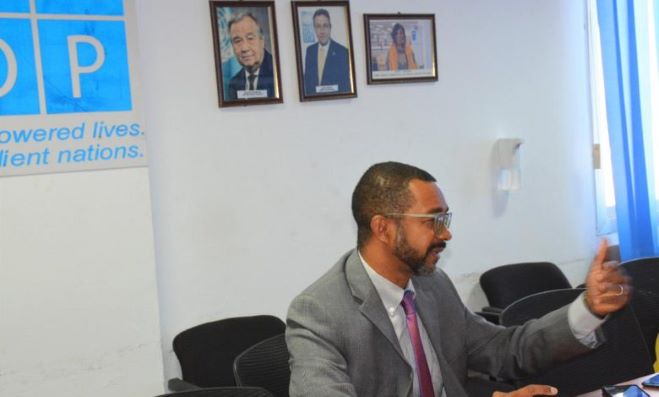By Stephen Rodrigues, UNDP Resident Representative, Liberia
October 17 each year is observed as International Day for the Eradication of Poverty. This day presents an opportunity to reflect on the challenges and constraints that are keeping people poor, and to collectively reassess the effectiveness of our efforts to eradicate poverty.
Despite the relatively small population of Liberia, poverty and inequality are major issues. Poverty affects 50.9 percent of the population, with the burden heavier in the rural areas (71.8%) as compared to urban settings (31.5%). Liberia is ranked 175th out of 189 countries on the UNDP Human Development Index 2020.
According to the World Bank Macro Poverty Outlook of June 2020, Covid-19 increased extreme poverty in Liberia such that the proportion of people surviving on 1.90 $USD per day or less, rose from 44.4 percent in 2019 to 46.3 percent in 2020. While Covid is having a devastating impact on societies worldwide, it is the weaker economies and societies with inadequate social safety nets to cushion businesses and households that are worse off. The poor and the vulnerable in these societies are most at risk of being left behind.
Children without access to electricity and internet were unable to continue their education during Covid lockdowns, while those from wealthier families had access to more resources for home learning. When business activities declined due to the pandemic, it is those workers who were laid off and did not have adequate savings nor any form of unemployment insurance benefits that suffered the most. Covid has been more than just a health crisis; it is a human, economic and social crisis which has created greater hardships for the poor and vulnerable in Liberia, and globally.
As our societies gradually recover from the pandemic, key priority must focus on building forward better to ensure that economies are more resilient, and safety nets stronger to protect the most vulnerable. It is also a time to consider strategies that ensure that economic growth is inclusive, creating jobs and opportunities for all.
There are two central ideas that should guide us: shared prosperity, and leaving no one behind. Our collective efforts, national plans, investment promotion strategies must be geared towards ensuring that the benefits of growth and development are shared across all segments of the society and leave no one behind.
This underscores the urgency of not only investing in decentralisation in Liberia, but also providing basic social and economic infrastructure in rural areas. Lifting more Liberians out of poverty will require greater public and private investments in activities that create jobs, and improve human capital. These would be investments in health, education, access to water and sanitation, rural roads, markets, agricultural productivity improvements, etc.
Liberia’s Pro-Poor Agenda for Prosperity and Development (PAPD) sets out a good vision for the country. It aims to provide greater income security to Liberians and reduce absolute poverty by 23 percent over the coming years. It recognizes the importance of scaled-up investments in agriculture, infrastructure, human resource development, and social protection.
The task now is to make this happen, and swiftly. It will not be easy, and certainly not in the face of the unrelenting Covid-19 pandemic, which has just led the International Monetary Fund (IMF) to again lower global economic growth forecasts for this year and next year.
But there are encouraging signs: Liberia’s domestic revenues have been increasing, public debt levels are high but sustainable, the overall economy is stabilising, there is fiscal discipline, and the country is adhering to the parameters of its agreement with the IMF under the Extended Credit Facility. Also, Liberia’s international development agencies continue to stand with, and provide valuable support to the country.
So, how does Liberia capitalise on all this to advance growth and create better living conditions for its people, especially the poor and vulnerable?
- By placing a laser-like focus on improving the Ease of Doing Business to make it easier for reputable companies to invest, and remain invested in Liberia – the key to long term job creation and economic expansion.
- Through collective, robust efforts to improve accountability and reduce leakage of public resources so that more of the country’s scarce resources can be used for the benefit of the majority, and not just a few people.
- By strengthening decentralization, including adopting measures to increase the share of national resources retained by counties, complete with strong measures of accountability. This is key to improving service delivery to Liberians across the country.
Finally, I believe there is room for Liberia to do something only a few lesser developed countries have done – design a ‘Marshall Plan’ for the Poor. This would be an ambitious national programme to invest in providing basic social and economic infrastructure and services targeting the rural parts of the country, and aimed at boosting economic activity and improving human capital. At present there are a number of good, isolated initiatives, some targeting the energy and agriculture sectors, for example. But there just might be an opportunity to embark on one of the most significant poverty reduction and rural economic development initiatives any country has ever undertaken. Could Liberia pull this off? I believe it can.
Someone once told me that our ambitions must match the scale of the problems we face. UNDP in Liberia would welcome the opportunity to work with the Government of Liberia, other development partners, the private sector and civil society organisations to tackle this challenge, which we know has solutions, and to design something ambitious – perhaps a Liberian Marshall Plan for the poor.

